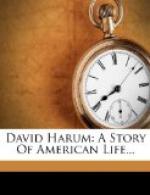They sat for a while smoking in silence, the contemplation of his woes having apparently driven other topics from the mind of the harassed clergyman. At last he said, turning to our friend:
“I have heard your voice in church.”
“Yes?”
“And I noticed that you sang not only the hymns but the chants, and in a way to suggest the idea that you have had experience and training. I did not come here for the purpose,” said Mr. Euston, after waiting a moment for John to speak, “though I confess the idea has occurred to me before, but it was suggested again by the sight of your piano and music. I know that it is asking a great deal,” he continued, “but do you think you could undertake, for a while at least, to help such a lame dog as I am over the stile? You have no idea,” said the rector earnestly, “what a service you would be doing not only to me, but to my people and the church.”
John pulled thoughtfully at his mustache for a moment, while Mr. Euston watched his face. “I don’t know,” he said at last in a doubtful tone. “I am afraid you are taking too much for granted—I don’t mean as to my good will, but as to my ability to be of service, for I suppose you mean that I should help in drilling your choir.”
“Yes,” replied Mr. Euston. “I suppose it would be too much to ask you to sing as well.”
“I have had no experience in the way of leading or directing,” replied John, ignoring the suggestion, “though I have sung in church more or less, and am familiar with the service, but even admitting my ability to be of use, shouldn’t you be afraid that my interposing might make more trouble than it would help? Wouldn’t your choir resent it? Such people are sometimes jealous, you know.”
“Oh, dear, yes,” sighed the rector. “But,” he added, “I think I can guarantee that there will be no unpleasant feeling either toward you or about you. Your being from New York will give you a certain prestige, and their curiosity and the element of novelty will make the beginning easy.”
There came a knock at the door and Mr. Harum appeared, but, seeing a visitor, was for withdrawing.
“Don’t go,” said John. “Come in. Of course you know Mr. Euston.”
“Glad to see ye,” said David, advancing and shaking hands. “You folks talkin’ bus’nis?” he asked before sitting down.
“I am trying to persuade Mr. Lenox to do me a great favor,” said Mr. Euston.
“Well, I guess he won’t want such an awful sight o’ persuadin’,” said David, taking a chair, “if he’s able to do it. What does he want of ye?” he asked, turning to John. Mr. Euston explained, and our friend gave his reasons for hesitating—all but the chief one, which was that he was reluctant to commit himself to an undertaking which he apprehended would be not only laborious but disagreeable.
“Wa’al,” said David, “as fur ’s the bus’nis itself ’s concerned, the hull thing’s all nix-cum-rouse to me; but as fur ‘s gettin’ folks to come an’ sing, you c’n git a barn full, an’ take your pick; an’ a feller that c’n git a pair of hosses an’ a buggy out of a tight fix the way you done a while ago ought to be able to break in a little team of half a dozen women or so.”




